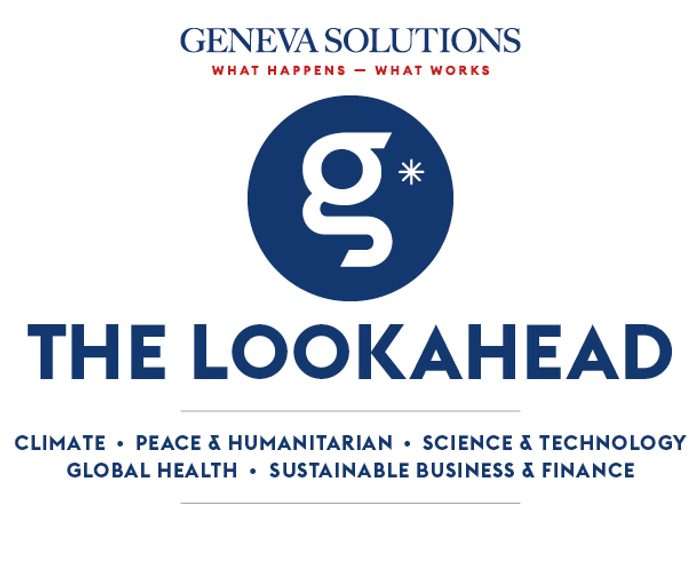Good morning, this is Michelle. Time is running out as countries struggle to bridge significant gaps in negotiations for a new pandemic treaty. A two-week marathon session starting today will be their last chance to finalise a deal ahead of the World Health Assembly at the end of May.
Also this week in Geneva, a UN conference will address the risks of mines and unexploded ordnance, and UNRWA chief Philippe Lazzarini will pay a visit to the Palais des Nations as he tries to convince donors to resume funding for the Palestinian aid agency. |

|

A nurse outside of a hospital in Melbourne, Australia, 6 July 2022. State and territory health experts were considering whether to expand the availability of fourth vaccine doses as concerns rise over COVID-19 sub-variants. (KEYSTONE/EPA/DIEGO FEDELE AUSTRALIA AND NEW ZEALAND OUT)A nurse outside of a hospital in Melbourne, Australia, 6 July 2022. State and territory health experts were considering whether to expand the availability of fourth vaccine doses as concerns rise over COVID-19 sub-variants. (KEYSTONE/EPA/DIEGO FEDELE AUSTRALIA AND NEW ZEALAND OUT)
|
|
|
💥MINE ACTION NEEDED.
Representing not only an immediate risk during warfare, mines and unexploded ordnance are major impediments to development that could impact communities and peoples’ livelihoods for decades. Sixty million people globally live with that threat. But removing the materiel often fails to receive enough attention and funding. “This is a story that sometimes people forget,” Christelle Loupforest, UN Mine Action Service (UNMAS) head of global mine action coordinator and Geneva chief, told journalists Friday.
Authorities, NGOs, private sector representatives and experts will huddle here till Wednesday to share best practices and also meet with donors to highlight the “dire situation” of UNMAS’ voluntary trust fund.
|
|
Look here.
Where to prioritise investment is “one of the most difficult questions”, Loupforest said, adding that more resources are needed in numerous forgotten emergencies – including Ethiopia, Burkina Faso, Mali, Somalia, Nigeria, the Democratic Republic of Congo and Afghanistan, one of the most contaminated countries – where explosives are sometimes put along roads and in markets.
|
|
In Gaza.
UNMAS estimates that the war has already produced some 37 million tonnes of debris, including hundreds of demolished buildings, or 300 kilos per sq metre, that would need some 100 trucks and 14 years to clear mines from.
|
|
🛬LAZZARINI IN TOWN.
A week after a commission investigating operations at UNRWA, the UN agency for Palestinian refugees, reported that it failed to see any evidence of Israeli allegations linking staff to terrorism but that more could be done to improve vetting processes and ensure neutrality, the organisation’s chief, Philippe Lazzarini, will be paying a visit to the Palais des Nations.
His presence in Geneva comes as his own country, Switzerland, remains among a handful of donors still reluctant to restore funding even after the report was hoped to rebuild confidence in UNRWA. After Germany announced last week it would resume funding to the agency, Lazzarini is hoping that yet more states will pitch in to help respond to the dire situation, particularly in Gaza, on the verge of famine, according to the UN.
The report said UNRWA’s work was “indispensable” to providing vital services such as education, sanitation and health in Gaza and Palestinians across the region. On Friday, the UN provided a brief on a separate ongoing internal UN report, saying that investigations into five of 19 allegations against UNRWA staff had been suspended or closed due to either insufficient or no evidence provided by Israel.
|
|
💡INNOVATION UPDATE.
The World Intellectual Property Organization’s 2024 report, entitled “Making innovation policy work for development”, is expected out on Thursday.
With middle-income countries among the fastest risers in WIPO’s latest rankings, the patent and trademark organisation has in recent years been keen to spread the word about how everyone from Indigenous communities to local artists can benefit from intellectual property.
|
|
|
GS news is a new media project covering the world of international cooperation and development. Don’t hesitate to forward our newsletter!
Have a good day!
|

|
|
Avenue du Bouchet 2
1209 Genève
Suisse
|
|
|
|








